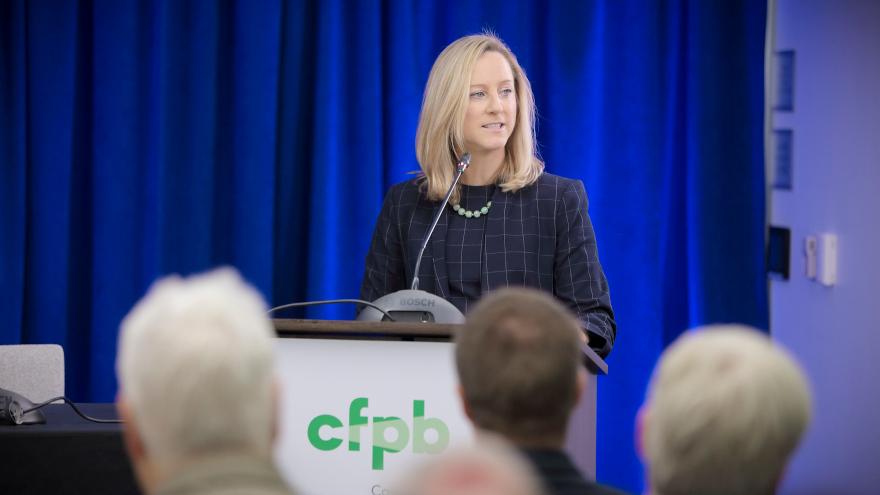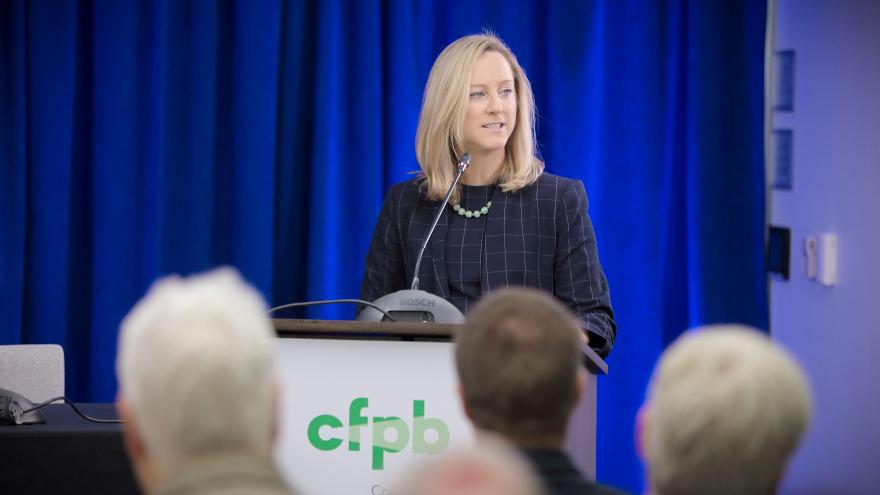Last week, the Federal Trade Commission announced it issued an administrative complaint against a marketer pushing a program involving dealership and potential pandemic stimulus benefits.
And this week over at the Consumer Financial Protection Bureau, officials said they will provide an additional 60 days for public comment on its request for information on how best to create a regulatory environment that expands access to credit and ensures that all consumers and communities are protected from discrimination in all aspects of a credit transaction.
The FTC action involved Traffic Jam Events and its owner, David Jeansonne II, charging multiple counts of deceptive conduct. The FTC explained administrative complaint mirrors a prior federal court complaint, which the regulator said it voluntarily dismissed to pursue a broader administrative proceeding.
The administrative complaint alleged that the marketing agency deceived consumers with mailers supposedly directing them to obtain federal COVID-19 stimulus benefits. The complaint also alleged that, in addition to the misleading COVID-19 mailers, the company sent flyers to consumers containing matching numbers indicating that consumers had won a valuable prize.
The FTC said consumers were then told they had to go to a dealership to “claim” the prize, but the small print on the back of the mailer revealed that there was only a 1-in-52,000 chance the consumer had actually won the prize specified.
In addition to FTC Act violations alleged related to the COVID-19 and prize mailers, the FTC’s complaint claimed the respondents violated the Truth In Lending Act and Regulation Z for failing to clearly disclose required credit information in their advertising.
The FTC vote to issue the administrative complaint and dismiss the federal proceeding was 4-0-1, with commissioner Rebecca Kelly Slaughter recorded as not participating.
The FTC reiterated that it issues an administrative complaint when it has “reason to believe” that the law has been or is being violated, and it appears to the commission that a proceeding is in the public interest.
“The issuance of the administrative complaint marks the beginning of a proceeding in which the allegations will be tried in a formal hearing before an administrative law judge,” officials said.
Update on CFPB project
Earlier this summer, the CFPB issued a request for information to seek public input on how best to create a regulatory environment that expands access to credit and ensures that all consumers and communities are protected from discrimination in all aspects of a credit transaction.
The bureau reiterated that the Equal Credit Opportunity Act and Regulation B make it unlawful for any creditor to discriminate against any applicant, with respect to any aspect of a credit transaction on the basis of race, color, religion, national origin, sex, marital status, or age; because all or part of the applicant’s income derives from any public assistance program; or because the applicant has in good faith exercised any right under the Consumer Credit Protection Act.
The original deadline for submissions was Oct. 2. The comment period will now close on Dec. 1.
“The information provided will help the bureau continue to explore ways to address regulatory compliance challenges while fulfilling the bureau’s core mission to prevent unlawful discrimination and foster innovation,” officials said in a news release.
The CFPB added the RFI is in lieu of a symposium the bureau had planned to host on ECOA issues this fall.
To read the RFI, go to this website.
Along with its director giving testimony to both House and Senate committees, last week also included the Consumer Financial Protection Bureau issuing a request for information (RFI) to seek public input on how best to create a regulatory environment that expands access to credit and ensures that all consumers and communities are protected from discrimination in all aspects of a credit transaction.
The bureau reiterated that the Equal Credit Opportunity Act (ECOA) and Regulation B make it unlawful for any creditor to discriminate against any applicant, with respect to any aspect of a credit transaction on the basis of race, color, religion, national origin, sex, marital status, or age; because all or part of the applicant’s income derives from any public assistance program; or because the applicant has in good faith exercised any right under the Consumer Credit Protection Act.
“The information provided will help the bureau continue to explore ways to address regulatory compliance challenges while fulfilling the bureau’s core mission to prevent unlawful discrimination and foster innovation,” officials said in a news release.
The CFPB added the RFI is in lieu of a symposium the bureau had planned to host on ECOA issues this fall.
To read the RFI, go to this website.
Meanwhile, director Kathleen Kraninger also gave federal lawmakers updates when the Senate Banking Committee and the House Financial Services Committee conducted separate hearings. Kraninger offered details stemming from bureau’s spring 2020 semi-annual report, which included activities from last October through March.
“Clearly, the COVID-19 pandemic had a profound impact on the bureau’s work during the reporting period, one that will continue well into the future. These remain challenging times facing our nation and the world. Yet the uncertainty and dramatic change underscore the importance of the Bureau’s mission on behalf of American consumers,” Kranginer said.
Kraninger also mentioned that from Jan. 1 through July 26 consumers have submitted more than 270,000 complaints to the bureau and more than 14,000 complaints specifically reference coronavirus.
Each month from March through June also set a new monthly record for complaints, according to the CFPB director.
“Our consumer contact center and our online portal have operated efficiently and effectively throughout the pandemic to take consumer complaints and refer the complaints to companies for response,” Kranginer said.
While many of the developments that happened during the semi-annual report period involved the mortgage space, Kraninger also emphasized a CFPB activity that certainly can involve auto financing — its supervision authority.
“Supervision is the heart of this agency – something underscored by the percentage of our personnel and resources dedicated to conducting exams,” Kraninger said. “I am focused on ensuring we use this tool as effectively and efficiently as possible and that we apply it in a consistent way. Heading trouble off at the pass may not grab big headlines, but it will prevent a lot of headaches for consumers and industry.”
More details about the CFPB’s semi-annual report to Congress can be found here.
While it might seem like it’s already been a decade since the coronavirus pandemic started to impact our lives, it’s truly been 10 years since the signing of the Dodd–Frank Wall Street Reform and Consumer Protection Act, which opened the path for creation of the Consumer Financial Protection Bureau.
An array of industry experts and leaders shared with me how much the regulatory world has changed since the Dodd-Frank Act was signed on July 21, 2010, making it more challenging for the auto-finance industry. I’ll begin my recap of their perspectives with Celia Winslow, who is senior vice president of the American Financial Services Association.
“The biggest regulatory change for the auto finance industry since the Dodd-Frank Act is clearly the creation of the Consumer Financial Protection Bureau,” Winslow told me. “While auto-finance companies have been supervised and regulated at the state level, and under the jurisdiction of the Federal Trade Commission and subject to regulations issued by the Federal Reserve Board at the federal level, CFPB supervision marks the first time that these financial institutions have been supervised by a federal financial regulator.
“We appreciate the bureau’s recent focus on providing clear rules of the road for the auto-finance industry,” Winslow continued. “Without clarity, compliance can be challenging. AFSA continues to push for a bipartisan commission structure at the bureau to further enhance that clarity.”
Ignite Consulting Partners chief legal and compliance officer Steve Levine not only works with finance companies, but the firm also has franchised and independent dealerships on its nationwide client roster. Levine also made the connection of Dodd-Frank, the CFPB and other agencies.
“Dodd-Frank has had a profound impact on the auto finance industry,” Levine said. “The creation of the CFPB and the leadership role it has taken has had an obvious effect, but I also believe that the FTC has become a more active and aggressive agency because of the CFPB. And the relationships that the bureau forged with state regulators and attorneys general has also made a significant mark.
“Further, it's been my observation that much of the CFPB’s work in issuing guidance has been interpreted as ‘best practices’ and been used by plaintiffs’ lawyers as a playbook to bring an action against industry participants,” he added.
Whether coming from lawsuits from a private firm or an action from the CFPB, the past 10 years certainly have been active in the penalty front in the auto-finance segment. Here are just a couple of examples:
— In January 2016, the CFPB made an enforcement action against Herbies Auto Sales, then a buy-here, pay-here operator in Greeley, Colo., for what the bureau deemed to be abusive financing schemes, hiding auto finance charges and misleading consumers. The CFPB said Herbies was to pay $700,000 in restitution to harmed consumers, with a suspended civil penalty of $100,000.
— In April 2017, the CFPB said that Security National Automotive Acceptance Company (SNAAC) violated a consent order from 2015, demanding that the finance company make good on the redress it owes to consumers and pay an additional $1.25 million penalty. The CFPB initially ordered SNAAC, which specialized in working with servicemembers, to pay both redress and a civil penalty for illegal debt collection tactics, including making threats to contact servicemembers’ commanding officers about debts and exaggerating the consequences of not paying. The bureau determined SNAAC violated the 2015 order by failing to provide more than $1 million in refunds and credits, affecting more than 1,000 consumers.
— In December 2013, the CFPB in coordination with the Department of Justice ordered Ally Financial to pay $80 million in damages to harmed African-American, Hispanic, and Asian and Pacific Islander borrowers and $18 million in penalties because the agencies determined that more than 235,000 minority borrowers paid higher interest rates for their auto financing between April 2011 and December 2013 because of Ally’s “discriminatory” pricing system.
While Ally Financial now is a thriving company, SNAAC and Herbies eventually exited the business.
Also of note since Dodd-Frank arrived and the creation of the CFPB was the regulator’s controversial 2013 guidance on indirect auto financing. That guidance claimed dealer discretion on interest rates creates a “significant risk” of unintentional disparate impact discrimination and spelled out the bureau’s intention to pursue enforcement actions on that basis such as the Ally Financial penalty.
Federal lawmakers eventually got the guidance removed five years later.
Critics pointed out the CFPB’s theory was based on shaky methodology for determining disparate impact, and the guidance was put in place without comments from stakeholders, public hearings or studies of its effect on the cost of credit to consumers.
“Without seeking any public comment or studying the impact on consumer credit,” National Independent Automobile Dealers Association senior vice president of legal and government affairs Shaun Petersen said in 2018 when Congress took action, “and with no evidence to back up its claim, the bureau issued a rule under the guise of guidance to limit dealers’ ability to meet their customers’ needs when shopping for credit.
“We applaud Congress for taking steps to rescind the bureau’s overreach,” Petersen added.
It’s unknown whether different lawmakers elected to be in Congress and the White House would have altered the trajectory of activities since Dodd-Frank. But National Automotive Finance Association executive director Jack Tracey reiterated why the organization began to take more profound moves related to compliance and training.
“When the bureau first came into existence it initially approached its task through heavy enforcement actions. This catapulted compliance activities to be among the activities that are most closely monitored by senior management. Auto finance companies could not afford to deal with heavy non-compliance penalties. Company management quickly realized that they need skilled professionals in senior positions to appropriately deal with compliance challenges,” Tracey said.
“Appropriate training of these compliance managers became a concern and that’s when the NAF Association stepped in with its Compliance Certification Program. Now, 10 years later over 650 compliance professionals have completed the program. Many of them continue to engage on a regular basis to discuss compliance issues through the Association’s Quarterly Compliance Roundtables,” he continued.
“Today, more senior management attention is directed a compliance matters because of the CFPB, but the industry has met the challenges through an educated management team,” Tracey went on to say.
Current NAF Association president Joel Kennedy closed with several points that encompass not just finance companies, dealerships and even the regulators, but all of us since we’re still consumers, too.
“A thorough understanding of the regulatory environment represents baseline ‘table stakes’ for all lenders, noteholders and third-party vendors in automotive finance,” Kennedy told me. “I saw this first from the lender side, where lenders have been placed into a position of indirectly regulating dealers\ and service providers and requiring them to demonstrate competence and control effectiveness. At the end of the day, the lenders are ultimately accountable in the eyes of the CFPB.
“From the standpoint of supporting industries (like third-party vendors), I have seen a broad-base of willingness to truly understand the regulations and ensure compliance with the regulations. Many times, lenders learn about critical regulatory changes from their service providers first,” he continued.
“Finally, the politicization of the CFPB, with their initial strategy of ‘regulation through enforcement’ definitely took a toll on the industry,” Kennedy went on to say. “This negative approach really set the tone for the relations between the bureau and lenders. The good news is that 'regulation through enforcement' changed with the appointment of the current director.
“With a more hospitable situation where dialog can occur, the NAF Association is proud to have cultivated a healthy working relationship with the bureau, which we believe is ultimately beneficial for the American consumer,” he added.
And with how this COVID-19 world is, no doubt we could all use all the benefits we can get.
Nick Zulovich is senior editor at Cherokee Media Group and can be reached at [email protected].
The Consumer Financial Protection Bureau made a series of personnel moves last week, including the creation of a new division.
Most notably, director Kathleen Kraninger announced that Thomas Pahl will serve as the deputy director of the bureau. Pahl has served as policy associate director for research, markets, and regulations since April 2018. Previously, Pahl was the acting director of the bureau of consumer protection at the Federal Trade Commission.
“Tom is a committed public servant who has dedicated his career to protecting consumers in the financial marketplace. His wealth of experience on consumer protection issues will enable him to provide valuable insights on achieving our mission and preventing consumer harm,” Kraninger said in a news release. “I look forward to his continued contributions and leadership.”
From 2013 through 2016, Pahl served as managing counsel for the office of regulations at the CFPB. He has also held previous roles at the FTC focused on enforcement, rulemaking and policy on financial services matters, including assistant director of the division of financial practices.
Kraninger also announced the leadership for the newly created Consumer Education and External Affairs (CEEA) Division. The regulator explained CEEA will focus on a more coordinated and bureau-wide approach to engagement and communication with consumers, policymakers, academics and other stakeholders.
Chosen to be a part of the CEEA are:
—Delicia Reynolds Hand will serve as deputy associate director for the Consumer Education and External Affairs Division. Hand joined the bureau in 2012 and has more than 20 years of experience, having worked in consumer advocacy, community and economic development and on Capitol Hill.
—Desmond Brown will serve as the assistant director for the office of consumer education. Brown has more than two decades of experience working with national and local organizations to increase financial well-being and economic opportunities for consumers. He first joined the bureau as a program specialist for the office of financial empowerment in 2012.
—Matt Cameron will serve as assistant director for the office of stakeholder management. Cameron has served at the bureau since 2012, most recently as the staff director for the advisory board and councils office. He has more than a decade in public service having worked prior in the United States Congress.
In addition to the offices of consumer education and stakeholder management, the division will include the newly formed office of public affairs, which will be led by Marisol Garibay, and the office of consumer response, which will be led by Christopher Johnson.
The CEEA division will be led by policy associate director Andrew Duke.
Like so many shops connected with auto financing, federal regulators are working in virtual environments, too.
Just before the holiday weekend, the Consumer Financial Protection Bureau (CFPB) and the Office of the Comptroller of the Currency (OCC) announced they will host joint, virtual innovation office hours later this month as part of the American Consumer Financial Innovation Network (ACFIN).
The agencies explained participants will have the opportunity to discuss issues that touch upon both consumer protection and prudential regulation during the virtual gatherings set for July 29-30.
Office hours are one-on-one meetings with representatives from the OCC and CFPB Offices of Innovation to discuss financial technology (fintech), new products or services, partnering with a bank or fintech company, or other matters related to responsible innovation in financial services. Each meeting will last no longer than one hour.
Officials said interested parties should request a virtual office hours session by July 17 via this website. They are asked to provide information on the topic(s) they are interested in discussing with the Offices of Innovation. Specific meeting times and arrangements will be determined after the OCC and CFPB receive and accept the request.
The CFPB, along with its state partners, launched ACFIN last year to enhance coordination among federal and state regulators as it relates to innovation and to further objectives such as consumer access, competition and financial inclusion.
Additionally, ACFIN provides a platform for members to share information to facilitate coordination on innovation policies and programs. In addition to the CFPB and OCC, ACFIN members include the attorneys general from Alabama, Alaska, Arizona, Colorado, Georgia, Indiana, Ohio, South Carolina, Tennessee and Utah along with state financial regulators from Florida, Georgia, Missouri, Ohio, Utah, Tennessee and Wyoming.
ACFIN membership is open to any state and federal partners interested in joining, according to officials.
More reaction rolled in stemming from Monday’s Supreme Court decision involving the Consumer Financial Protection Bureau.
While some legal experts are pondering long-term ramifications of the decision, nearly half of the attorneys general in the U.S. celebrated because the Supreme Court also agreed with the argument made in a multistate amicus brief connected to how these states could oversee auto-finance companies and other providers of financial services.
Led by New York attorney general Letitia James and joined by a coalition of 23 other attorneys general, they said they fought to ensure that the states can continue to benefit from “powerful tools” granted to both the CFPB and the states under Title X of the Dodd-Frank Act to safeguard against fraud and abusive consumer practices.
To recap, the Supreme Court ruled via a 5-4 decision in Seila Law LLC versus CFPB, determining the bureau’s leadership structure was unconstitutional and changed its single director from a position that could only be fired for cause to a what some officials are calling a “political position” removable at the will of the president.
In 2017, the coalition recapped that the CFPB commenced an investigation into the California law firm Seila Law for its debt-relief practices. Seila Law sought to block the investigation entirely, arguing that the CFPB is unconstitutionally structured because the agency’s director may only be terminated by the president “for inefficiency, neglect of duty, or malfeasance in office.”
According to Seila Law, this for-cause removal provision impinges on the executive power and violates the U.S. Constitution’s separation of powers clause. The U.S. District Court for the Central District of California and U.S. Court of Appeals for the Ninth Circuit both rejected Seila Law’s arguments and upheld the constitutionality of the CFPB.
While the Supreme Court on Monday reversed those decisions, holding that the Dodd-Frank Act’s for-cause removal provision is unconstitutional, the coaltion pointed out the Supreme Court further held that the CFPB’s creation and the powers it has to protect consumers are severable from that provision — the position that the amicus brief led by James had advocated.
While the CFPB director can now be removed at the will of the president, James called on the current CFPB director to work to protect consumers and ensure the financial protection of the American people, instead of focusing on protecting financial institutions.
“Following the Great Recession, the Dodd-Frank Act created the CFPB and granted vigorous enforcement powers to the states to ensure that consumers could never again be egregiously defrauded, deceived, or misled by private companies, and with today’s Supreme Court decision, that important work can continue,” James said in a news release. “Although we disagree with the Supreme Court’s ruling about the director’s independence, a separate ruling the court issued protects years of financial and consumer protections that have saved Americans hundreds of millions of dollars and remedied countless abusive and fraudulent practices.
“The CFPB can continue to be an independent enforcer of consumer protection and states can continue to pursue remedies under federal law to root out fraud and abusive consumer practices in the market. It’s time, however, that the current CFPB director actually focus on the financial well-being of the American people, instead of leaving them to fend for themselves,” James went on to say.
The other attorneys general involved in this coalition included:
—California
—Colorado
—Connecticut
—Delaware
—Hawaii
—Illinois
—Maine
—Maryland
—Massachusetts
—Michigan
—Minnesota
—Nevada
—New Jersey
—New Mexico
—North Carolina
—Oregon
—Pennsylvania
—Rhode Island
—Vermont
—Virginia
—Washington
—Washington, D.C.
—West Virginia
—Wisconsin
Legal scholars chime in, too
David Driesen, a professor at the College of Law at Syracuse University, worries about how much more power the president now in connection with the CFPB.
“The Supreme Court today created a Presidential constitutional right to fire government officials for political reasons. President Trump’s abuse of firing authority and the history of the world show that such unchecked power threatens the rule of law and the survival of democracy,” Driesen said in a statement sent to SubPrime Auto Finance News.
New Civil Liberties Alliance (NCLA) elaborated about that point even further. The NCLA said it’s a nonpartisan, nonprofit civil rights group founded by legal scholar Philip Hamburger to protect constitutional freedoms from violations. NCLA said its public-interest litigation and other pro bono advocacy strive to tame the unlawful power of state and federal agencies and to foster a new civil liberties movement that will help restore Americans’ fundamental rights.
“The unelected and unaccountable CFPB director has been described as the ‘second most powerful person in Washington, D.C.,’ a situation created when Congress decided to insulate this particular agency head from any oversight by our elected officials. Fortunately, the Supreme Court understood that this structure violates the very foundation of our republic, ruling that it is the president who is the head of the executive branch, and all executive branch officials are answerable to him. Today’s ruling is a win for Constitutional order.” NCLA senior litigation counsel Harriet Hageman said in another statement to SubPrime Auto Finance News.
Michael DeGrandis, another NCLA senior litigation counsel, added, “Because the court mistakenly left the rest of the statute intact, it has created an entirely new problem that may be even more constitutionally pernicious than the first. The president now has total control over an agency with a direct pipeline to Federal Reserve funds, without any appropriations control from Congress. This unconstitutional setup should be struck down at the court’s first opportunity.”
The Consumer Financial Protection Bureau still exists even after a noteworthy Supreme Court decision arrived on Monday involving its director.
However, the handwringing about how the agency operates and can wield its regulatory influence over auto finance and other segments of financial services appears likely to continue for some time.
Via a 5-4 decision, the Supreme Court ruled in Seila Law LLC versus CFPB, determining the bureau’s leadership structure was unconstitutional and changed its single director from a position that could only be fired for cause to a what some officials are calling a “political position” removable at the will of the president.
“The CFPB dodged a bullet and remains in business, but it’s unclear what today’s ruling means for past CFPB actions,” Hudson Cook partner Lucy Morris said in a message to SubPrime Auto Finance News.
“Can these simply be ratified by the director, who now operates at the pleasure of the president? Today’s decision answers the threshold Constitutional issue, while leaving many questions unanswered,” continued Morris, who previously was a CFPB deputy enforcement director and now chair of Hudson Cook’s government practice group.
In an opinion written by Chief Justice John Roberts, the American Financial Services Association recapped that the Supreme Court held that, “the CFPB director’s removal protection is severable from the other statutory provisions bearing on the CFPB’s authority.”
The ruling goes on to note, “The agency may therefore continue to operate, but its director, in light of our decision, must be removable by the president at will.”
AFSA explained the court’s decision means — barring Congressional action to make additional statutory changes — that the CFPB director serves at the pleasure of the president in a similar way to cabinet-level appointees.
“AFSA is pleased that the court recognized the immense power wielded by the CFPB director,” the association said in a statement on its website. “We continue to believe that the bureau should be constructed as other regulatory commissions in Washington are. The association will continue to advocate for that structure, which would provide necessary consistency to the bureau.”
Consumer Bankers Associations president and chief executive officer Richard Hunt gave a cautious reaction to Monday’s development.
“The court’s ruling eliminates the bureau’s independence through the creation of an at-will director, further exacerbating the political influence that has already plagued the bureau,” Hunt said in a statement. “This outcome subjects consumers and the financial services industry to potentially radical regulatory shifts with each administration. It is inconceivable that Congress, which wanted to shield the bureau from political vagaries, would have approved that result. Congress had many opportunities to ensure the CFPB would be more independent and bipartisan.
“Rather than allowing judicial action to create a political agency Congress never intended, Congress should immediately pass legislation creating a bipartisan commission to lead the CFPB — just as the Democratic-led House of Representatives originally intended in 2009.”
Earlier this month, AFSA, the Consumer Bankers Association along with other 15 trade associations, submitted a letter to Sen. Deb Fischer, a Nebraska Republican, supporting her proposal that would transform the CFPB’s leadership structure.
“This isn’t a new issue for AFSA, however. The association has long sought a commission structure, similar to other federal regulatory bodies, to bring fair and consistent oversight of the financial services industry. AFSA pressed for a five-member, bipartisan commission structure at the bureau long before its actual founding,” the association said.
“During the debate over the Dodd-Frank Wall Street Reform Act, AFSA, many other trade associations and members of Congress from both sides of the aisle recommended a commission structure,” AFSA went on to say.
The National Association of Federally-Insured Credit Unions (NAFCU) and its president and CEO, Dan Berger, also reiterated the need for commission to oversee the CFPB.
“With today's Supreme Court decision allowing the president to remove the CFPB Director at will, it is essential Congress advance legislation establishing a bipartisan commission at the bureau to promote greater transparency, accountability and long-term stability,” Berger said.
“A bipartisan board offers stable, long-term leadership that would better provide for the needs of consumers. NAFCU will continue to advocate for Congress to pass legislation reforming the CFPB's single-director leadership structure into a bipartisan board.”
While a debate about a potential CFPB leadership commission is likely to continue, Hudson Cook plans to examine Monday’s Supreme Court decision and share its findings during a webinar on tap for 12:30 p.m. ET on Wednesday.
Morris, along with fellow Hudson Cook partners Allen Denson and Mark Rooney, intend to discuss the implications of the decision and its impact on past, pending and future CFPB enforcement actions, examinations and rulemakings.
Registration for that Hudson Cook webinar can be completed here.
The Consumer Financial Protection Bureau was on the receiving end of two separate actions this week aimed at dramatically changing how the agency operates.
First, a collection of consumer advocate groups is suing the CFPB and director Kathleen Kraninger for unlawfully creating and operating the taskforce on federal consumer financial law in violation of the Federal Advisory Committee Act (FACA).
Then, Sen. Deb Fischer reintroduced legislation that would change the structure of the CFPB from a single director to a bipartisan commission of five individuals.
The Nebraska Republican said she has long been concerned about the structure of CFPB leadership, first introducing a version of this legislation in 2013. Fischer indicated that she is reintroducing this legislation after the Supreme Court heard arguments in March during the case involving Seila Law versus CFPB as to whether Congress violated the separation of powers when it put a single director in charge of enforcing consumer protection laws.
The CFPB previously announced it would no longer defend its structure after years of lawsuits and calls to reform from stakeholders. This month, the Supreme Court is expected to issue its ruling.
Fischer highlighted the Financial Product Safety Commission Act of 2020 would:
—Replace the Consumer Financial Protection Bureau with a bipartisan Financial Product Safety Commission of five individuals (all appointed by the President, confirmed by the Senate).
—Have commissioners each serve staggered five-year terms, and no more than three commissioners could be from the same political party.
—Create a chair of the commission position (to fulfill administrative and other duties), which shall initially be the individual serving as director of the CFPB on the day before the date of enactment of this legislation. This person would serve as chair until the president has appointed all five members of the commission and appoints one member to serve as the subsequent chair of the commission.
“I have long advocated for reforming the CFPB to increase its transparency and accountability. With the Supreme Court set to issue an opinion this month on the constitutionality of the CFPB’s single director, my bill offers a common-sense solution for reforming the bureau,” Fischer said in a news release.
A bipartisan, multi-member commission would help ensure good governance, prevent rash decision making, and result in more economic certainty for Americans starting businesses and providing for their families,” she added.
Fischer’s action brought an immediate reaction from Dan Berger, who is president and chief executive officer of the National Association of Federally-Insured Credit Unions (NAFCU).
“By establishing a bipartisan commission at the CFPB, consumers would benefit from more robust debate, diversity of thought, and a stable leadership structure at the agency,” Berger said in a statement.
“We thank Senator Deb Fischer for introducing this important legislation, and we encourage Congress to swiftly pass this bill,” Berger continued. “Until the CFPB's leadership structure is reformed by Congress, we look forward to continuing to work with Director Kathy Kraninger. Over the years, she has been responsive, transparent, and receptive to the needs of credit unions.”
Organizations such as the Consumer Bankers Association also have Congress to swiftly pass legislation to ensure the CFPB’s independence and constitutionality by replacing the single director structure with a five-person, bipartisan commission, as originally intended by the House when it first passed the Dodd-Frank Wall Street Reform and Consumer Protection Act in 2010.
“Congress should create a bipartisan commission — as the House did originally in 2009 — at the CFPB in place of an unaccountable sole director to ensure the agency is balanced, stable and best prepared to uphold the bureau’s consumer protection mandate for years and decades,” Consumer Bankers Association president and CEO Richard Hunt said in a statement last May.
More details about taskforce lawsuit
A group of consumer advocates wants the bureau to uphold its mandate, too, but is coming at the issue from a completely different way.
Just days after the taskforce chair shared an updated on its progress, representing the National Association of Consumer Advocates (NACA), U.S. Public Interest Research Group (PIRG) and consumer law expert Kathleen Engel, Democracy Forward sued CFPB and Kraninger Tuesday for unlawfully creating and operating the taskforce on federal consumer financial law in violation of the Federal Advisory Committee Act (FACA).
The groups contend the Taskforce is stacked with “industry-aligned members, excludes consumer advocates, does not serve a public interest, and has conducted its work behind closed doors — all in violation of federal law.”
This suit filed in the U.S. District Court for the District of Massachusetts seeks to put a halt to the taskforce’s “unlawful operation” and stop the CFPB from relying on its work.
“A group of hand-picked industry lawyers and consultants that meets behind closed doors — with no consumer advocates or disparate points of view — is more appropriately called a Task Farce. But this Task Farce is no joke,” U.S. PIRG senior director of federal consumer programs Ed Mierzwinski said in a news release. “Not only is CFPB breaking the law, their actions continue to be dangerous for consumer protection.”
Democracy Forward executive director Anne Harkavy added, “The federal consumer financial law taskforce is the latest effort by a Trump appointee to outsource policymaking to private interests while excluding other voices. We’ve stopped them before, and we’re asking the court to stop them here. In the midst of an economic downturn, the CFPB should not be excluding consumer advocates from key policymaking conversations about how to protect American families.”
Along with chair Todd Zywicki— who also is professor of law at George Mason University Antonin Scalia Law School, senior fellow of the Cato Institute, and former executive director of the GMU Law and Economics Center — the taskforce members are:
— Howard Beales III, former professor of strategic management and public policy at George Washington University and former director of the bureau of consumer protection at the Federal Trade Commission
— Thomas Durkin, who retired as senior economist at the Federal Reserve Board
— Jean Noonan, current partner at Hudson Cook and former general counsel at the Farm Credit Administration and former associate director of the bureau of consumer protection’s credit practice at the Federal Trade Commission
“The CFPB’s unlawful creation of this Taskforce is just the latest cynical attempt by the agency’s leadership to undermine our nation’s necessary consumer protections,” said Ira Rheingold, executive director for National Association of Consumer Advocates. “Coming at a critical moment in our country when consumers will need more protection, not less, this taskforce — filled with industry apologists — is the last group of people we should be looking to for consumer protection advice.”
In selecting the taskforce membership, lawsuit organizers said the CFPB rejected the applications of many consumer protection experts and advocates, including Suffolk Law professor Kathleen Engel — a prominent scholar of consumer law and finance who has sat on the CFPB’s Consumer Advisory Board — and University of Minnesota law professor Prentiss Cox, who was the first chair of the bureau’s Consumer Advisory Board.
After interviewing for a position on the taskforce, Engel noted that “views on deregulation were a criterion” and decried the “inquisitorial” nature of the interview.
Ultimately, the lawsuit organizers said CFPB ended up naming only members with ties to the financial industry while excluding consumer advocates.
“It distresses me that political appointees at the CFPB are willing to defy the law in order to push their deregulatory agenda and undermine the agency’s mission of protecting American families,” Engel said.
Earlier this week, the chair of the taskforce on federal consumer financial law created at the beginning of the year by the Consumer Financial Protection Bureau offered an update on the group’s progress on examining the existing legal and regulatory environment facing consumers and financial services providers.
Todd Zywicki highlighted in a blog post on the CFPB’s website that the taskforce held a listening session back in March with representatives from various consumer advocacy and trade groups. Zywicki indicated the session helped to shape the Request for Information (RFI) to assist the taskforce that was issued by the bureau later that month.
Zywicki — who also is professor of law at George Mason University Antonin Scalia Law School, senior fellow of the Cato Institute, and former executive director of the GMU Law and Economics Center — shared some of the taskforce’s planned efforts going forward into the fall, which include:
— Request for Information (RFI): Now that the RFI comment window has closed, the taskforce will analyze the comments we have received.
— Public hearing: The CFPB intends to announce details for a public hearing later this summer, at a time and in a format that enables participation consistent with the safety of all participants.
— Public listening session with the bureau’s advisory committees: The taskforce intends to participate in a public listening session with the bureau’s four advisory committees, which will take place this fall.
Zywicki indicated insights from the RFI, the public hearing, the taskforce’s research and the advisory committee listening session will help inform the recommendations that will ultimately be included in its final report to CFPB director Kathleen Kraninger.
When it formed the group, the bureau indicated the taskforce will produce new research and legal analysis of consumer financial laws in the United States, focusing specifically on:
— Harmonizing, modernizing and updating the federal consumer financial laws and their implementing regulations
— Identifying gaps in knowledge that should be addressed through research
— Ways to improve consumer understanding of markets and products
— Potential conflicts or inconsistencies in existing regulations and guidance
Along with Zywicki, the taskforce members are:
— Howard Beales III, former professor of strategic management and public policy at George Washington University and former director of the bureau of consumer protection at the Federal Trade Commission
— Thomas Durkin, who retired as senior economist at the Federal Reserve Board
— Jean Noonan, current partner at Hudson Cook and former general counsel at the Farm Credit Administration and former associate director of the bureau of consumer protection’s credit practice at the Federal Trade Commission
“As chair of the taskforce, I am committed to ensuring the public can inform our work, through transparent and inclusive engagements,” Zywicki wrote in this week’s blog post. “The feedback we receive will be used to inform a two-volume report that the taskforce will produce.
“The first volume will provide a historical overview of consumer financial protection laws, analyze costs and benefits of financial products and services, outline redundancies and gaps in the current regulatory framework, and assess the current state of the laws and their influence on consumers and the marketplace,” he continued. “The taskforce will use the insights gained to develop a set of recommendations for the bureau on ways to improve and strengthen the application of financial laws and regulations in the second volume.
“All of this activity will be centered around the underlying principle of strengthening consumer protections in the financial marketplace, in accordance with our statutory mandate,” Zywicki went on to say.
Additional information about the Taskforce, including the Request for Information, is available here.
Consumer Financial Protection Bureau director Kathleen Kraninger had a busy public agenda last week, sharing remarks at National Association of Realtors 2020 legislative meetings as well as the public meeting of the Financial Literacy and Education Commission, along with a gathering of the Financial Stability Oversight Council.
During each of her appearances, Kraninger referenced the record volume of consumer complaints the bureau has recently received as well as what federal plans are in motion to help individuals and businesses impacted financially by the coronavirus pandemic.
“There is no doubt that COVID-19 has had a profound impact on our country, our economy and our individual lives,” Kraninger said at the meeting of regulators orchestrated by Treasury Secretary Steven Mnuchin.
“At the Consumer Financial Protection Bureau, we are focused on protecting consumers in the financial marketplace. That entails ensuring consumers have information on their rights, protections and options as well as ensuring financial institutions are in compliance with federal consumer financial law,” Kraninger continued.
“Through robust engagement with financial institutions, consumer advocates, government partners, and the public directly, the bureau monitors what is happening in the market and takes appropriate action,” she added.
Kraninger pointed out in March and April the bureau received approximately 36,700 and 42,500 complaints, respectively, marking the highest monthly complaint volumes in the CFPB’s history. She did not specifically mention auto financing when noting the volume figures; instead touching on credit reporting, debt collection, mortgages and credit cards as the generators of most complaints.
“A significant portion of complaints as a result of the pandemic are about issues consumers encounter when seeking alternative payment options for their mortgages, credit cards, auto loans and leases, student loans and other loans,” Kraninger said during the public meeting of the Financial Literacy and Education Commission, which she serves as vice chair.
“Consumers report that they are seeking changes to loan terms, such as suspension of payments, lower interest rates, longer loan terms and other ways to postpone or lower monthly payments because they have lost their jobs or are working fewer hours,” she continued. “The bureau’s complaint system and other stakeholder engagement mechanisms are important in informing the bureau’s work, including our supervisory and enforcement activity.
“I want to make clear that at all times, and particularly during this unprecedented crisis, we will not hesitate to take public enforcement action against companies or individuals that engage in unfair, deceptive, or abusive acts or practices, or otherwise violate consumer financial law,” Kraninger added.
“We are monitoring the marketplace in real time and coordinating on an ongoing basis with federal and state agencies and regulators. We are taking, and will continue to take, swift action when we identify companies or individuals that violate the law to exploit consumers,” she went on to say.
Kraninger acknowledged consumers are facing significant financial challenges. She referenced the bureau’s “Making Ends Meet” survey conducted last year that determined 52% of households would not be able to cover expenses for more than two months if they lost their main source of income by borrowing, using savings, selling assets or seeking help from friends or family.
“During this challenging time, I appreciate the commitment of everyone to come together and help consumers. We are all in this together and helping every consumer in need is our goal,” Kraninger told the National Association of Realtors.
“As was noted in my introduction, I worked in government during 9/11 and one of the things that struck me most was how Americans come together during a crisis,” she continued. “Regardless of how we identify based on where we live or our beliefs, we band together in time of need and help each other. I know that we have already been doing that and will continue to do so during the pandemic.”












